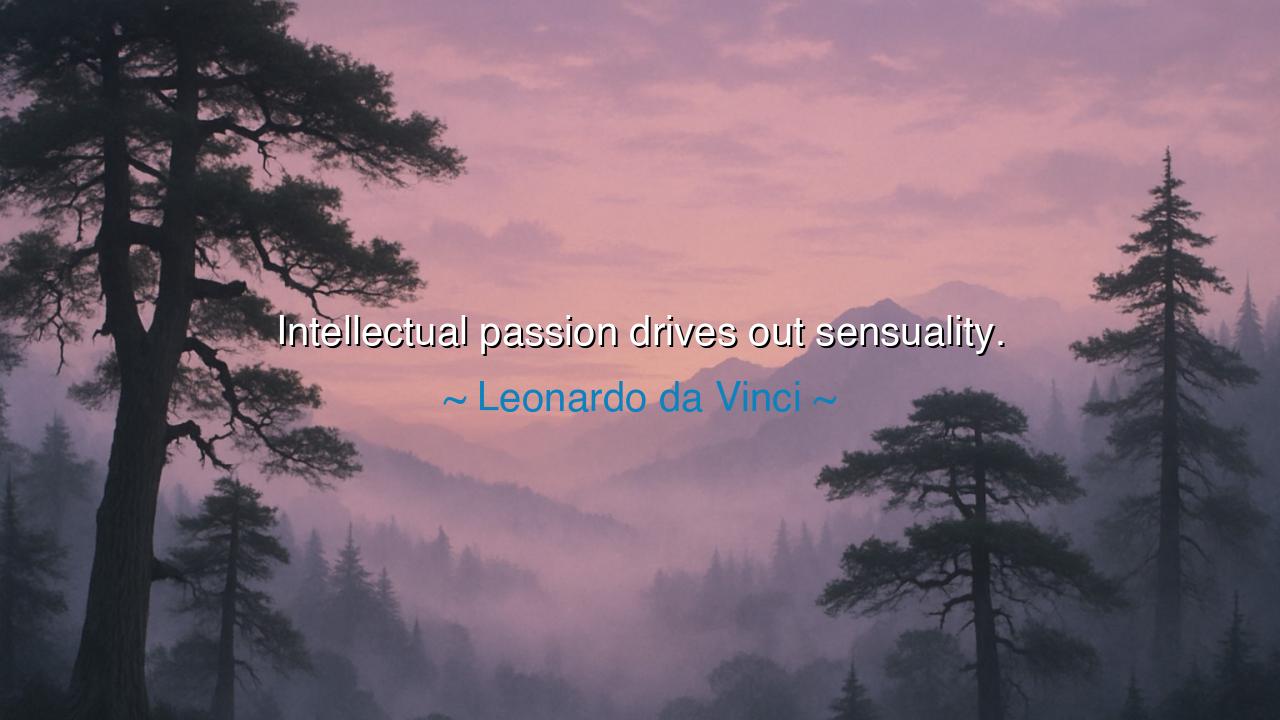
Intellectual passion drives out sensuality.






“Intellectual passion drives out sensuality.” — Thus spoke Leonardo da Vinci, the master of mind and mystery, whose spirit bridged the divine and the earthly. In this saying, he reveals a truth that transcends centuries: that the fire of the intellect, once kindled, can burn away the distractions of mere desire. For Leonardo knew that there are two flames in man — one that burns low and close to the ground, feeding upon the senses; and another, purer and brighter, that rises upward, feeding upon knowledge, creation, and the love of truth. When the higher fire is awakened, the lower dims. Thus, the intellectual passion — the hunger to know, to understand, to bring order and beauty to the world — becomes the noblest force in the human soul.
To Leonardo, the life of the mind was not cold or detached, but a living fire, a sacred ecstasy. He was not content merely to see — he needed to understand. The curve of a bird’s wing, the ripple of water, the anatomy of a hand — to him, all were gateways to divine knowledge. His passion for learning was so intense, so consuming, that it left no room for the coarse indulgences of appetite. For when one’s soul is absorbed in the grandeur of discovery, the pleasures of the flesh lose their hold. Sensuality, bound to the fleeting moment, fades before the eternal joy of understanding.
Consider the life of Leonardo himself, the great exemplar of his own wisdom. Though surrounded by the art and luxury of Renaissance Italy, he lived simply, even ascetically. He cared little for wealth or excess. His delight was not in feasting or pleasure, but in experiment and creation. He spent sleepless nights sketching the geometry of flight, dissecting the human form by candlelight, pondering the movement of planets and tides. Others pursued the satisfaction of the senses; he pursued the truth behind the senses. His intellectual passion consumed him completely — and through it, he transcended the limits of ordinary humanity to touch the immortal.
The ancients would have recognized this truth. Plato spoke of the soul’s ascent from desire to wisdom — from the love of beauty in the body to the love of beauty in truth. Leonardo, in his own time, embodied that ascent. He did not deny sensuality; he transformed it. The energy that others spent on fleeting pleasure, he redirected toward creation, invention, and contemplation. Thus, he found a deeper pleasure — not the brief flame of indulgence, but the steady light of understanding. For the mind that seeks truth feels a joy greater and purer than any the body can give.
And yet, Leonardo’s words are not a rejection of life’s beauty — they are its refinement. To be ruled by sensuality is to be a slave to impulse; but to be ruled by intellectual passion is to become a creator, a builder, a seeker of the divine. The sensualist consumes beauty; the thinker creates it. When the mind rises in contemplation, the senses are not silenced, but harmonized — their power becomes a bridge, not a prison. Thus, true discipline does not kill desire; it ennobles it, giving it purpose and direction.
In every age, we see the proof of this truth. Marie Curie, who risked her life for the pursuit of science; Galileo, who faced persecution for his discoveries; Michelangelo, who carved his devotion into stone — all were driven by that sacred flame of intellectual passion. Theirs was no denial of life, but the fullest expression of it. They found joy not in possession, but in revelation. For them, thought itself became an act of love — love for truth, for creation, for the vast and wondrous order of existence.
The lesson, then, is this: awaken within yourself the higher fire. Let your curiosity, your hunger for meaning, your desire to know, become your guiding passion. When you feel the pull of lesser pleasures, turn instead to the work that fulfills the soul — to study, to creation, to acts of insight and beauty. Fill your days with wonder, and the lower cravings will lose their voice. For once the mind is lit with the flame of intellectual passion, it hungers no longer for what is shallow, but for what is eternal.
So remember the teaching of Leonardo da Vinci: do not waste your spirit on fleeting indulgence, but feed it with wisdom, discovery, and creation. Let your heart burn for truth, your hands labor for beauty, your mind seek understanding. For in that pursuit lies the highest joy — the joy of a soul awakened, of a spirit that has risen beyond the senses to behold the infinite. Such is the life not of indulgence, but of illumination — the life of the true creator, the true thinker, the true man divine.






AAdministratorAdministrator
Welcome, honored guests. Please leave a comment, we will respond soon